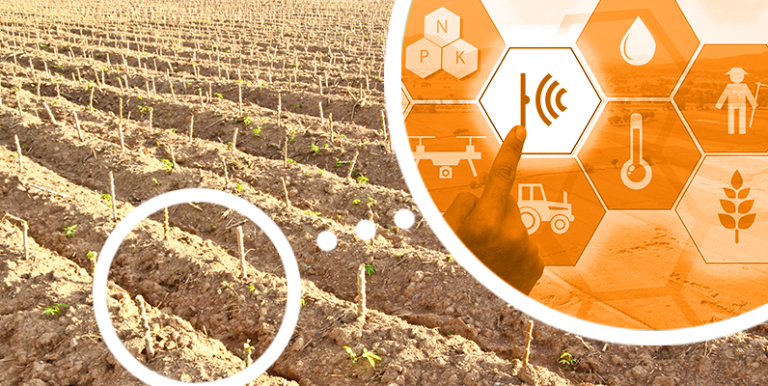UCL researcher presents technology to increase productivity of African agriculture
27 October 2020
An ICCS member has presented a technology solution to increase the productivity of cassava farming in his home country of Nigeria

Author: Dr Temitope Odedeyi, Research Fellow
and Dr Rob Thompson, Institute Manager
IoT | RF | Agriculture
ICCS member Dr Temitope Odedeyi last week presented to an international audience the results of a technological solution to increase cassava farming productivity in Nigeria.
The results, presented to the IEEE International Symposium on Circuits and Systems (ISCAS), show that the starch content of a cassava root can be estimated through measurements of the return loss at radio frequencies. The results have been verified through field tests using a handheld test instrument developed by a UCL team.
The starch content of the tropical root crop is the most important metric in determining the market value of cassava for industrial processes and the export market for cassava, which provides staple food for about 800 million people globally.
The team of researchers that produced the work is headed by Professor Izzat Darwazeh, Professor of Communications Engineering, and includes Dr Clive Poole, Associate Professor (Teaching), and Dr Temitope Odedeyi, Research Fellow. The UCL team are all members of ICCS and researchers within the UCL Department of Electronic and Electrical Engineering.
The team worked with partners at the International Institute of Tropical Agriculture (IITA), Ibadan and the Federal University of Agriculture Abeokuta, in Nigeria, to undertake field tests of the technology.
The UCL team hope that by providing a sensor technology that gives a viable means to determine this market-critical metric the technology will remove a major entry barrier for small and medium holder cassava farmers in sub-Saharan Africa to the more profitable industrial and export markets.
Speaking about the results of the work Dr Odedeyi, who grew up in a cassava farming region in Nigeria, said:
"This is a breakthrough invention. This technology provides a means to develop easy-to-use and accurate instruments that can be manufactured at sufficiently low cost to allow widespread use, even in poor cassava farming communities in sub-Saharan Africa."
In 2017, Dr Odedeyi first proposed the idea as part of a team that won the maiden Hack-Agtech competition, a platform conceived to foster technology solutions for the agriculture industry and organized between UCL and Rothamsted Research.
Through the Hack-Agtech competition, the technology received £10,000 in grant funding. Following this, in 2019, the continuing work received a £100,000 UCL Global Challenges Research Fund grant.
UCL has now partnered with Rinicom Limited, an SME based in Lancaster UK, as well as other stakeholder groups in sub-Saharan Africa to develop a commercialisation plan at minimal cost to the farmers.
The device, which will be Internet of Things (IoT) enabled is to be integrated with a cloud ecosystem developed by Rinicom and connect farmers directly with produce buyers and processors and also provide information to help the farmers optimise their yield and productivity.
Links
Paper "A Low-Cost Instrument for Estimating the Starch Content of Cassava Roots Based on the Measurement of RF Return Loss"
Professor Izzat Darwazeh's Profile
Dr Temitope Odedeyi
UCL Institute of Communications & Connected Systems
UCL Electronic & Electrical Engineering
UCL Engineering
 Close
Close

